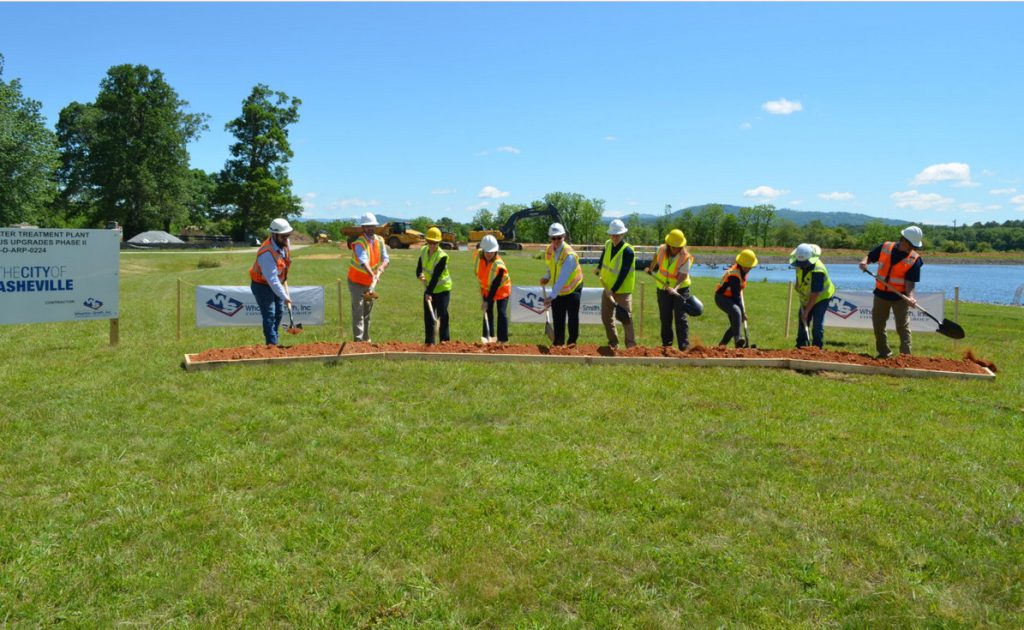Asheville – On May 23, the City of Asheville held a groundbreaking ceremony for Phase 2 of the Rehabilitation and Upgrade Project at the Mills River Water Treatment Plant (WTP). To be completed in three years, this phase, combined with a third, will double the facility’s output capacity. Phase 2 is expected to cost $23.3 million, which is coming from the Water Resources Capital Improvement fund.
On December 24, 2022, Asheville endured 81 hours of subzero temperatures. Waterline breakages were rampant. In addition to all the treated water spilling or gushing out, provident people running their faucets to prevent breakages were also draining the system. Thickening the plot, the lines supplying treatment chemicals to the water at the plant clogged. Valves malfunctioned, and a 24” one was found to be inadvertently shut. These misfortunes and mishaps snowballed into an extended outage affecting about 38,000 customers.
Elements of Phase 2 include a new clear well with a 1 million gallon capacity. Water is stored in clear wells following filtration and preliminary disinfection stages. As it sits in the holding tank, disinfectants work over time to neutralize all pathogens. The new clear well will supplement existing storage to triple the amount of finished water stored at the plant.
Additionally, new pumping systems will be installed for raw water intake. The city’s intention is to both increase capacity and provide redundancy to prevent future crises. In addition, the water plant’s emergency generator is being equipped with new switchgear “to provide more reliable and seamless power transfers during power loss situations.”
After Helene sullied the pristine, 334-acre reservoir at North Fork, customers affected by an even greater outage can appreciate that the city is adding to its off-stream raw water capacity at Mills River. The new reservoir will add 8 million gallons to the existing 15 million gallons of off-stream storage.
Setting the stage for Phase 3, a new backwash lagoon is being built. The lagoon is not necessary at this time, but it will be needed to hold the sludge filtered out of treated water following future expansion. Phase 3, which is expected to last three years as well, should begin in 2029.
The city has highlighted a few other major water system upgrades, showing it is tackling a backlog of deferred maintenance and justifying substantial rate increases. Work on the McDowell Street Water Line Replacement began last year. It involves the replacement of 6,600 feet of 12-inch water lines that are 80 years old. The lines run along Short McDowell Street and McDowell Street between Meadow Road and Southside Avenue. Leaks in the area have been described as “gushing” and “fountains,” some leading to road closures. Having been interrupted by Helene, work on the $4.7 million project, paid for by the capital fund, is expected to run through 2027.
Using a $4 million grant from the North Carolina Department of Water Infrastructure, the city replaced lead and galvanized pipes in the Shiloh Community. Shiloh qualified because it “is considered a historically-disadvantaged area per the city’s Climate Justice Map and the State of North Carolina’s Department of Water Infrastructure Map.”
Last year, the city completed the replacement of a 7000-foot stretch of a water main on Patton Avenue. The new, larger pipe is 24” in diameter. Work included a lot of excavation to lay encased pipe, sometimes as deep as 26 feet. The $6.3 million project will supply water to the growing population up Leicester Highway and reduce the number of water line breaks on Patton Avenue.
Asheville City Council approved a second year of water rate increases, consistent with recommendations from their consultant, Raftelis. This year, residential properties will see a 7.5% increase, and businesses will see rates go up anywhere from 7.5% to 25%. The city anticipated this would cause at least one, unnamed business to pay over $100,000 a year. Wholesale rates charged to neighboring communities will increase 33%.

